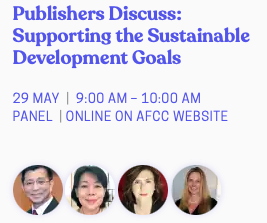3 speakers joined the conversation – Chua Hong Koon, Publishing Director of World Scientific Publishing Company (Singapore), Linda Tan Lingard of Oyez Books (Malaysia) and Lisa Lyons Johnston, President and Publisher of Kids Can press (Canada) each outlining initiatives and projects that their publishing businesses were engaged with to both contribute themselves towards the SDGs but also to raise awareness amongst different audiences of the SDGs and how individuals can take action towards various goals.
First up was Linda who talked about the switch to using FSC paper, which can be challenging in Malaysia which does not produce its own paper, so can be hard to source and can be expensive. Oyez books is also cutting down on glitter and other embellishments deemed harmful to the environment, and producing many more hardcover books so they last longer and can be passed around in families without be damaged. A key point made by Linda was the switch to using corrugated board in packaging, rather than plastics, which can have its downsides if left in the rain.
The SDGs also feature in the publishing list of Oyez, and a notable title ‘The Farmer’ was developed in partnership with Nature Classroom, an organisation that facilitates city families to spend time with nature. The book not only promotes the SDGs but is also made entirely environmentally friendly. Whilst the book costs more than the average book in Malaysia, a campaign with both consumers and the authors explained why the cost was higher and the contribution it was making towards the environment, leading to sales of 700 copies in less than a month.
The importance of educating authors and consumers about sustainability in the publishing process, and the need to both create and read books about the SDGs was a common theme among all speakers. Oyez Books recently held an exhibition about the SDGs called ‘Build a Better World’, which included activities and events for children, bringing on board a local sponsor who also wanted to show their switch to environmentally friendly products. Finally, as President of the Children’s Picture Book Association in Malaysia, Linda is leading the charge on establishing a Malaysian Chapter of the popular SDG Book Club.
Chua Hong Koon outlined the steps that World Scientific Publishing is taking to acquire content, in their scientific and children’s lists in relation to sustainability and inspiring action around the SDGs. This includes a fantastic series called ‘I Can Change The World’, showing small actions children can take themselves and what impact this can have. Within the publishing business itself, production has seen a big shift to both digital, and to Print on Demand, cutting down the environmental costs of transporting books to warehouses around the world and then on to the consumer.
In Canada, Kids Can Press is enhancing its ‘Citizen Kid’ brand, both showcasing and encouraging youth activism around the subject of saving the planet. The 50th anniversary of the publisher next year will see a new series of the brand issued, aimed at 5–7-year-olds. Being part of a larger multimedia group, the Citizen Kid brand has also made it to documentary format.
Based in Toronto, the Kids Can offices has taken every step it can to contribute to environmental savings including energy efficient lighting, use of rainwater to reduce water consumption, a living green wall and green rooftop, as well as using local and recycled materials wherever possible.
Publishers noted that whilst they are constantly thinking about environmental issues, they cannot be alone in this journey. It takes a collaboration of suppliers, authors, consumers, and other partners to make the big difference that is needed. Parents, educators, Booksellers, Librarians, Book Fairs and Festivals (as the AFCC has done) can all play their role in supply chains, awareness raising and taking practical steps to highlight and contribute to the SDGs. A fantastic example was given by Lisa whereby Citizen Kid books are being used by New York State Department for Education who had made the SDGs part of the school curriculum. Publishers can act directly, supporting partners with lesson plans, knowledge training, materials for booksellers and librarians and hosting events such as the one hosted by Oyez Books. Ultimately, we need consumers to be buying the books, for themselves and for the next generation of kids, and the message is that the books may cost a little more than other books, but in buying them you are both contributing to environmental savings, but also learning more about the small steps you can take yourself.

